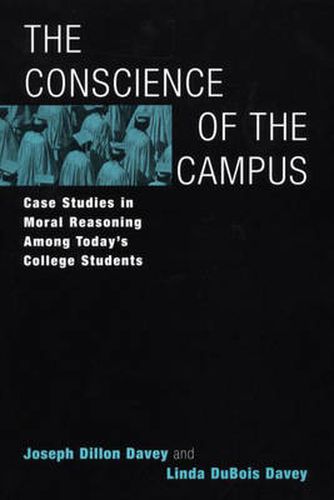Readings Newsletter
Become a Readings Member to make your shopping experience even easier.
Sign in or sign up for free!
You’re not far away from qualifying for FREE standard shipping within Australia
You’ve qualified for FREE standard shipping within Australia
The cart is loading…






The conscience of today’s college students is guided by the personal moral values that underlie its concept of justice. College professors frequently avoid discussions of moral values, fearful of either the deconstructionist’s criticism or the alleged wall of separation between church and state. Regardless of their reasons, they tend to argue that today’s students have no interest in discussing abstract concepts of morality. The Daveys argue that given the right case studies of moral dilemmas, today’s college students will enthusiastically share and discuss their own moral values, learn to critically examine pressing social issues, and grow to new levels of understanding.
More than two dozen scenarios involving moral questions concerning race, poverty, crime, drugs, sex, religion, educational funding, and constitutional rights are presented. These issues are faced by a generation raised during the information revolution. College students live in a world of such rapid change that nothing is certain about their future. It may well be that there has never been a time when college students were more eager to discuss fundamental questions about right and wrong, to examine their own moral values. This timely work is of value in any course touching upon moral values, including courses in sociology, education, political science and law, child development, criminal justice, and philosophy.
$9.00 standard shipping within Australia
FREE standard shipping within Australia for orders over $100.00
Express & International shipping calculated at checkout
The conscience of today’s college students is guided by the personal moral values that underlie its concept of justice. College professors frequently avoid discussions of moral values, fearful of either the deconstructionist’s criticism or the alleged wall of separation between church and state. Regardless of their reasons, they tend to argue that today’s students have no interest in discussing abstract concepts of morality. The Daveys argue that given the right case studies of moral dilemmas, today’s college students will enthusiastically share and discuss their own moral values, learn to critically examine pressing social issues, and grow to new levels of understanding.
More than two dozen scenarios involving moral questions concerning race, poverty, crime, drugs, sex, religion, educational funding, and constitutional rights are presented. These issues are faced by a generation raised during the information revolution. College students live in a world of such rapid change that nothing is certain about their future. It may well be that there has never been a time when college students were more eager to discuss fundamental questions about right and wrong, to examine their own moral values. This timely work is of value in any course touching upon moral values, including courses in sociology, education, political science and law, child development, criminal justice, and philosophy.